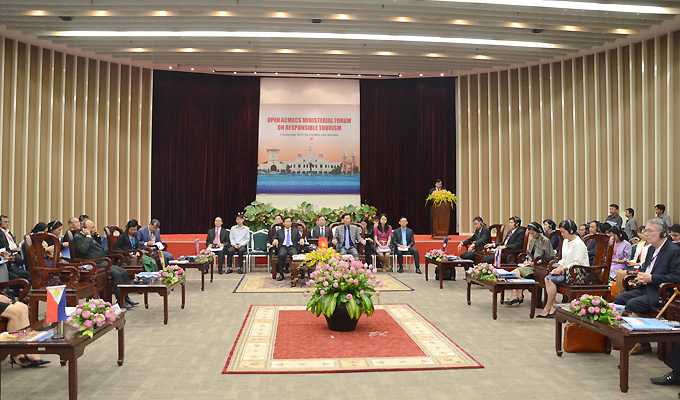(TITC) - The Open ACMECS Ministerial Forum on Responsible Tourism was held on 8 September 2016 in Ho Chi Minh City in the framework of the International Travel Expo 2016 (ITE-HCMC 2016).

In attendance were Tourism Ministers of member countries of the "Ayeyawady - Chao Phraya - Mekong Economic Cooperation Strategy” (ACMECS) cooperation framework (including Cambodia, Laos, Myanmar, Thailand and Viet Nam), representatives of tourism sector, international organizations, civil society and international experts.
The forum aimed at implementing the Action Plan for the period 2016-2018, strengthening sustainable regional linkage, seeking solutions to responsible tourism development in ACMECS region.
In his opening speech, Mr. Nguyen Ngoc Thien - Minister of Culture, Sports and Tourism of Viet Nam emphasized that sustainable development has been identified as one of the most important principles in the strategy and master plan on Viet Nam tourism development to 2020, vision 2030. In recent years, Viet Nam has prioritized the development of eco-tourism, green tourism and community-based tourism.
The Ministers appreciated the significant development of tourism in the ACMECS region in 2015 with 52 million international tourist arrivals (increasing 17% over 2014), including 8.8 million intra-regional tourist arrivals; and recognized that responsible tourism can play a significant role in the community empowerment which importantly contributes to socio-economic development, especially in remote and rural areas of the ACMECS countries. They were also conscious of possible environmental and social challenges during the development process; and also emphasized that responsible tourism can only be realized with the concrete responsibilities of all stakeholders.
At the forum, the ACMECS Tourism Ministers agreed to approve the ACMECS Ministerial Declaration on Responsible Tourism to reaffirm the ACMECS tourism sector’s commitment to responsible, sustainable, inclusive and balanced tourism development; strengthen responsible tourism policy framework; enhance information and experience exchanges; create adequate conditions for a responsible use of cultural and natural resources for tourism product development; encourage education, training; promote and support socio-economic advancement of vulnerable groups through responsible tourism; and promote the cooperation between the public and private sectors with the involvement of international and non-governmental organizations.
Hong Nhung